Roman Empire Elagabalus Silver Denarius (218-222 AD) NGC Choice VF! Attractive
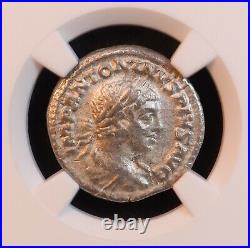
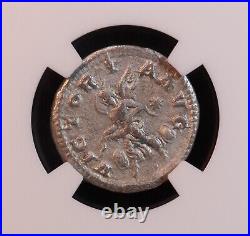
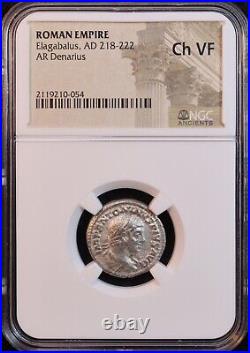
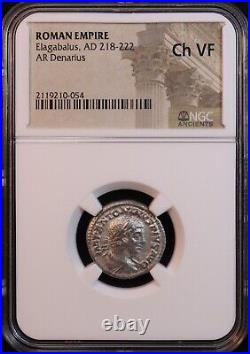


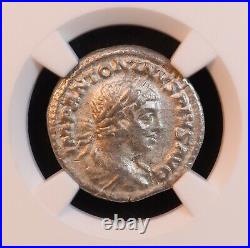
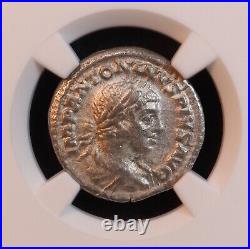
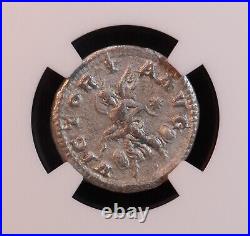
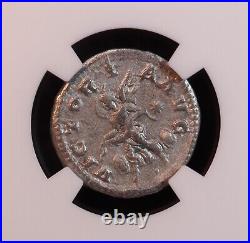




Roman Empire Elagabalus Silver Denarius (218-222 AD) - NGC Choice Very Fine! Laureate and draped bust right / Victory advancing left, holding open wreath, between two shields; star to left. Elgabalus was Roman emperor from 218 to 222 CE. Having failed to keep many of his promises to the army, Roman Emperor Macrinus (217 - 218 CE) was becoming increasingly unpopular, and it would only take a little lie from a young boy's mother to change everything. On May 16, 218 CE a fourteen-year-old teenager was sneaked into the camp of the Third Gallic Legion in Syria and proclaimed the new imperial ruler.
Shortly afterwards, Macrinus was dead. Although the new emperor would change his name to Marcus Aurelius Antoninus, history would know him as Elagabalus. Varius Avitus Bassianus (Elagabalus) was born in c. 204 CE (exact date unknown) at Emesa in Syria to Sextus Varius Marcellus, a former senator under Emperor Caracalla, and Julia Soaemis, niece of Septimius Severus's second wife Julia Domna.
At the time he assumed the title and throne, Elagabalus was the hereditary high priest at the Temple of the Sun for the Syrian sun-god Elagabal. Later, his extreme dedication to his religion would contribute to his demise. According to most sources, Macrinus had been instrumental in Caracalla's assassination. Because he feared her closeness to many in the army remaining loyal to the slain emperor, Macrinus commanded that Julia Domna, Caracalla's mother, leave Antioch.
After her death - she had starved herself rather than leave the city - her sister Julia Maesa and two nieces, Julia Soaemis and Julia Mamaea, swore revenge. On May 16, 218 CE the young Elagabalus was smuggled into the Third Legion's camp by the Roman commander Comazon and declared emperor. His mother's (and grandmother's) wealth and the young man's remarkable resemblance to Caracalla was enough to convince everyone that he was not the son of Varius Marcellus but the illegitimate son of Caracalla, or that is what his mother hoped they would believe. On June 8, 218 CE, Macrinus and his forces were defeated by the Roman commander Gannys outside Antioch. The fallen emperor's failed attempt to cross the Bosporus at Cappadocia and escape to Rome would bring about his (and his nine-year-old son's) death.
Macrinus's death and the claim that Elagabalus was actually Caracalla's son would be enough for the Roman Senate to accept him as the new emperor - the youngest to ever sit on the throne; official recognition would not come until his arrival in Rome. However, instead of leaving immediately, the new emperor, his mother and grandmother would winter at Nicomedia before arriving in Rome in the autumn of 219 CE. Unfortunately for the man who had defeated Macrinus, Gannys would not get to see his young protégé seated on the throne.
By some accounts he had been not only a protector but a father-figure to Elagabalus whilst others claim he was either a eunuch or Julia Soaemis' lover. Whatever his relationship to the family may have been, his closeness to the young emperor meant that he remained a threat to a controlling mother and grandmother, and this threat led to his death.
Upon his arrival in Rome and despite his youth, Elagabalus was officially recognized by the Senate as emperor - they had hoped for economic and political stability after the chaotic reigns of Caracalla and Macrinus. Controversy, however, would soon rear its ugly head; something that would not only anger the Senate but also shock much of the populace, especially the Christians and Jews. As a high priest Elagabalus made plans to replace the old, traditional religion of Rome with that of his own - the worship of Elagabal. This Syrian god was even to replace the supreme god of Roman mythology - Jupiter. To cement his intentions Elagabalus had a large, black conical-shaped stone (possibly a meteorite) brought from Syria - a cult symbol of his religion - and installed on the Palatine Hill. A new temple, the Elagabalium, was built to honor Elagabal. In his Roman History Cassius Dio, who called the emperor the "False Antoninus, " wrote, The offense consisted, not in his introducing a foreign god into Rome or in his exalting in very strange ways, but in his placing him even before Jupiter himself and causing himself to be voted his priest.. Furthermore, he was frequently seen even in public clad in the barbaric dress which the Syrian priests use, and this had as much to do as anything with his receiving the nickname of'The Assyrian. To help improve his relationship with the people of Rome and take attention away from the new religion, Elagabalus was encouraged to marry into a Roman aristocratic family. He would have three wives: Julia Paula, Annia Faustina, and Aquilia Severa - the latter "marriage" caused even more debate because she was a Vestal Virgin which was a long-standing taboo.He divorced Paula on the grounds she had some blemish on her body, and cohabited with Aquilia Severa thereby most flagrantly violating the law, for she was consecrated to Vesta, and yet he most impiously defiled her.. I did it [he said] in order that godlike children might spring from me. However, in order to prevent further controversy, the marriage was quickly dissolved.
Unfortunately, Elagabalus generally demonstrated little interest in any of his wives; his tastes ran in a different direction, preferring the company of men. Rumors were rampant that he wandered the imperial palace as well as the streets of Rome at night dressed as a woman.
He supposedly even married a male slave named Hierocles. Upon Elagabalus' arrival in Rome, many of those loyal to Emperor Macrinus were executed. And, while many in the Senate were left alone, other high ranking imperial officers were dismissed and replaced by unqualified "henchmen" from Syria. Of course, the day-to-day activities of government were ignored by the young ruler and left to others, namely, his mother and grandmother.
Both were granted the title of Augusta and even given permission to attend sessions of the Senate. Comazon, who had accompanied them to Rome, was named prefect of the Praetorian Guard. It did not take long for his family, as well as others throughout the empire, to realize that Elagabalus was completely unsuited for the imperial title, spending more time dancing around the altar of the temple and purchasing gold chamber pots and exotic foods than attending to the matters of the empire.
Uprisings within the army occurred throughout the provinces, and there was even a failed attempt to replace him on the throne. In the summer of 221CE Elagabalus was convinced by his family to name an heir. His thirteen-year-old cousin Bassianus Alexanus (the future Alexander Severus), the son of Julia Mamaea, assumed the title of Caesar. Seeing his cousin as a serious rival, Elagabalus began planning Alexanus' execution and the family became divided - Julia Soaemis stood behind her son, Elagabalus, while Julia Maesa and Julia Mamaea supported Alexanus.
On March 11, 222 CE Elagabalus ordered the execution of Alexanus; however, the Praetorian Guard refused, supporting Alexanus instead; they may have been bribed. On March 13, while at the Praetorian Guard camp, Elagabalus and his mother were executed, beheaded, dragged through the streets of Rome and dumped into the Tiber.He was eighteen-years-old and had been on the throne for only four years. They fell upon Elagabalus himself and slew him in a latrine in which he had taken refuge. Then his body was dragged through the streets, and the soldiers further insulted it by thrusting it into a sewer. But since the sewer chanced to be too small to admit the corpse, they attached a weight to it to keep it from floating, and hurled it...
Upon hearing the news of Elagabalus's death, the Senate condemned his memory and named Alexanus the new emperor, who would serve, with the help of his mother, until 235 CE when he too would be assassinated. Please Check out Our Web Site : antebellumnumismatics. Please reach out to us if you have any questions about any listings you see. ALL Precious Metals tested with our own Sigma Metalytics Precious Metal Tester and guaranteed genuine. The only exception is when items are damaged, tampered with, or removed from holders.All Bullion or Silver Sales are final as market conditions are constantly changing. Please check out our other listings! We have auctions almost every week so make sure to follow us! Follow our owner on Instagram as well at...
At Antebellum Numismatics LLC we try to offer a wide variety of items including graded and ungraded coins from modern to bust series, paper currency, obsolete and confederate currency, exonumia such as civil war and hard times tokens, world coins such as thalers and numismatic medals, and we are always listing interesting items as well as many rare key dates. And many other interesting items like shipwreck recovered coins and Ancient coins. We pride ourselves on having outstanding customer service. Coin grading is subjective and all coins can be interpreted differently, so we try to post very large, up close shots of each item we list. Be sure to take a close look and come up with your own opinion!
We are a family-owned small business and appreciate your business and feedback.
